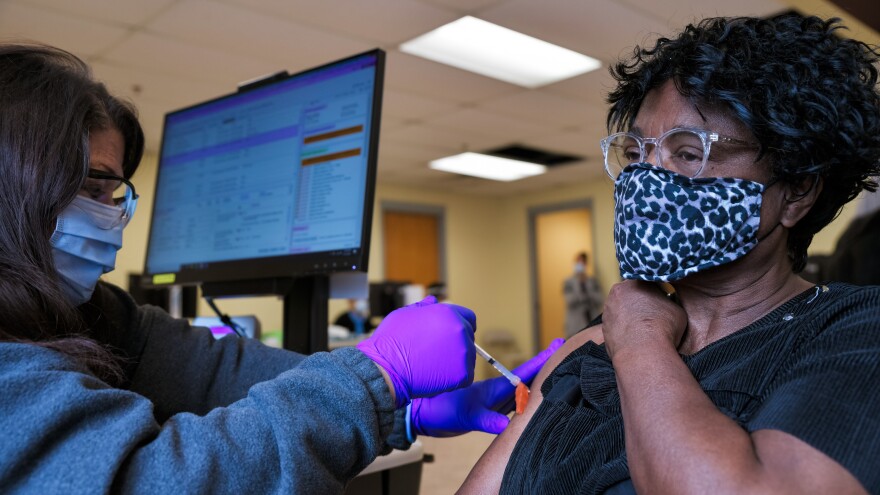There has been a perception that Black Americans are more hesitant than whites to receive a COVID-19 vaccine. But roughly equal proportions of Black and white respondents in a recent poll said they plan to get vaccinated.
The NPR/PBS NewsHour/Marist survey released last week found that 25% of Black respondents and 28% of white respondents said they did not plan to get a shot.
Yet in many states, there are racial disparities in who has received the shot. Dr. Rhea Boyd, a pediatrician and public health advocate in the Bay Area, says misinformation and lack of access to health care are bigger impediments for Blacks than a hesitancy to get vaccinated.
"We know that in this country, 1 out of 5 Black adults are unlikely to have a regular provider. They don't have somebody that they go to who they trust for their clinical care. We also know Black folks have some of the highest rates of uninsured and underinsurance," she tells NPR's Morning Edition.
The Kaiser Family Foundation, which has been tracking the ethnicity of people receiving COVID-19 vaccines, says it found "a consistent pattern across states of Black and Hispanic people receiving smaller shares of vaccinations compared to their shares of cases and deaths and compared to their shares of the total population."
In South Carolina, for example, Blacks are 26% of the population but they've made up only 16% of COVID-19 vaccinations so far.
Last month, NPR identified disparities in the locations of vaccination sites in major cities across the South — with most sites placed in whiter neighborhoods. NPR found that the health care locations likely to be used to distribute a vaccine tend to be located in the more affluent and whiter parts of town where medical infrastructure already exists.
Boyd, who wrote about the lack of health care access for Blacks in a recent New York Times op-ed, urges expanding the network of health care services and placing primary care clinics "right in Black communities."
She also calls for making "going to the doctor in the United States free. Cover it for people, particularly people who we know have suffered from the chronic effects of racial segregation and chronic discrimination, which shapes health outcomes."
"I think that would go a long way in ensuring that our health system no longer undertreats the needs of communities of color and Black folks in particular," she says.
Boyd says there's evidence that Blacks will seek out vaccines when they have access to them.
"I know that Black parents vaccinate their kids," she says. "Back in the 1990s, our federal government said let's eliminate cost as a barrier to vaccination for children. And they created the Vaccines for Children program. ... By 2005, there were no gaps between Black children and other racial and ethnic groups for receipt of regularly recommended vaccines like MMR and polio. When Black parents have the opportunity to vaccinate their children, they do vaccinate them."
Boyd and other Black health care workers and researchers created a campaign, called The Conversation: Between Us, About Us, to educate Blacks about COVID-19 vaccines.
"We knew that there were already baseline information gaps about how vaccines work and particular concerns that folks in the Black community had about this vaccine's development and their safety," Boyd says. "So we put together a campaign to actually tackle that misinformation so that when folks make the choice about vaccination, they can make an informed one."
She says the perception that Blacks are hesitant to get a COVID-19 vaccine has its roots in racial inequity.
"We sometimes blame individual patients or patients of color, like Black folks in particular for many of their health ailments," Boyd says. "We say the reason that you have higher rates of diabetes or higher rates of heart disease is your own individual choices. You know, your cultural choices to choose what to eat shapes your disparity rather than the structural environment around you that might place you in a food desert.
"I think in health care we have had an analysis of what drives racial health inequities that centers on individuals rather than on our systems. And that has led us not to really confront racism as a cause of racial health inequities, including right now during the vaccine distribution."
Copyright 2021 NPR. To see more, visit https://www.npr.org.






